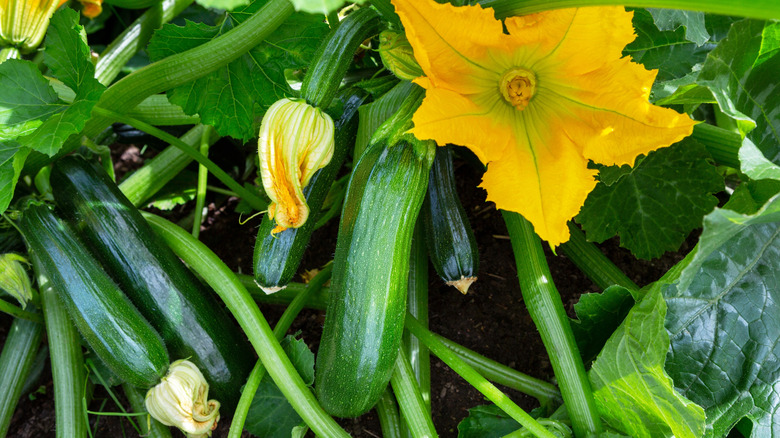How This Beautiful, Fragrant Flower Can Hack Your Garden Vegetables Into Growing
Lavender is a flower best known for enhancing the smell of your bubble bath and your nighttime pillow sprays, but did you know it has a bit of a rebellious streak too? This beautiful and dainty flower's more intense side comes out even more when it's planted next to certain vegetables. Zucchini in particular just loves having lavender as a neighbor because lavender brings in the pollinators like bees and butterflies. The more pollinators that are around means more flowers get fertilized, which then means more zucchini shows up on the vine for you to enjoy. But in addition to attracting the good bugs, it turns out that lavender is a bit of a tough guy who will chases off the bad ones too. The scent of lavender naturally repels aphids, moths, fleas, and other unwanted pests that might want to eat your precious crops.
The key to growing the two together isn't to just plant them next to each other and hope for the best. There are a few mistakes to avoid when growing lavender, many of which are even more true if you want it to work well as a companion plant. For example, bad drainage, overwatering, and the wrong type of soil will lead to an unhappy and barely flowering lavender, which isn't going to help your zucchini get anywhere fast. Soil and watering issues, plus a USDA Hardiness Zone compatibility of 5 to 9, means that your best bet may be to plant lavender in containers. That way you can keep them near zucchini plants for their blooms, overwinter them inside, and control the water and drainage.
What zucchini gets out of the relationship
Zucchini is a pretty easy crop to grow but it is a little unruly — especially given that it grows fast, sprawls out, and attracts a variety of pests. In fact, these pests are one of the biggest downsides to growing zucchini, especially in mid-to-late-summer when powdery mildew and squash vine borers are even more prevalent. It's certainly wise to give your zucchini a strong ally in the form of some lavender plants.
Since zucchini flowers have a short life span ( sometimes they only open for a single day),you want as many pollinators around your plants as you can manage. Having lots of colorful blooms will boost yield significantly, and other options in addition to lavender include sunflowers and borage — some surefire ways to bring in the bees. Marigolds, nasturtiums, and basil can also be good additions. Plus, the latter two are edible, which is always a bonus.
So if you enjoy mapping out a plan for your summer garden, don't overlook lavender as a plant that not only looks and smells great, it also knows how to get stuff done. Check out our more easy tips for growing zucchini, but you don't need fancy tools, a gardening degree or anything too complicated — you just need zucchini plants, healthy soil, and a good reliable companion plant — like lavender.

